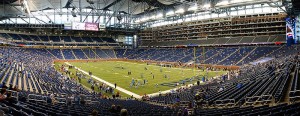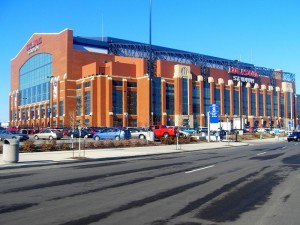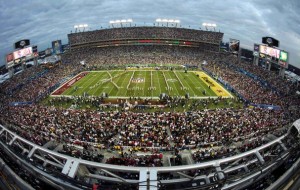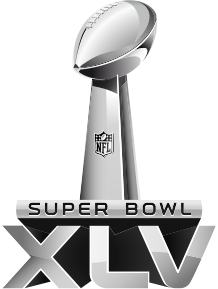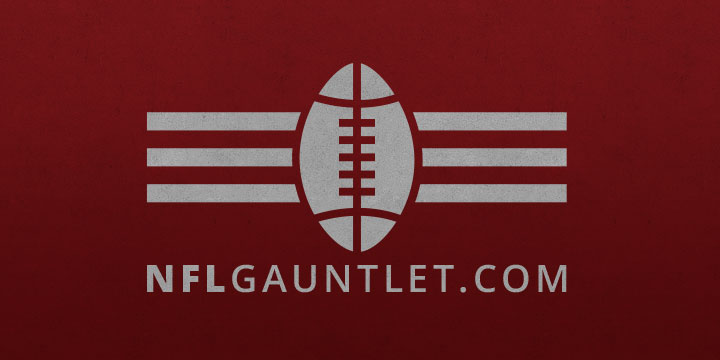As soon as Dallas Cowboys owner Jerry Jones built his monument to football in Arlington, Texas, and earned the right to host Super Bowl XLV, his stated goal for “America’s Team” was to make a Super Bowl run and become the first team to hold true “home-field” advantage for the biggest game on the NFL calendar. With the Cowboys coming off a successful season where they won the NFC East division and tallied their first breakthrough playoff victory under head coach Wade Phillips, the idea didn’t seem too far-fetched.
Fast-forward to the end of the 2010 NFL season and this year’s Cowboys won’t even finish with a winning record or make the playoffs, let alone compete for the chance to play host to the league’s title game.
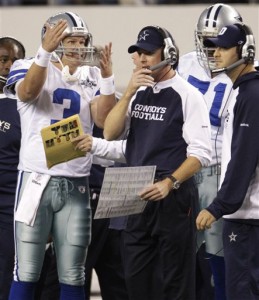
Role Call: Jon Kitna as starting QB, Jason Garrett as interim head coach, and Tony Romo helping from the sideline. (AP Photo/Tony Gutierrez)
However, as we look ahead to the next three Super Bowl venues—the only future venues that have been confirmed at this time—there is a legitimate chance that an NFL team could take the field with the Lombardi Trophy on the line at their stadium.
Before we get to those possibilities, however, let’s consider how close—spoiler: or not very close at all—the NFL has gotten to having a team actually “host” a Super Bowl they played in over the past 20 seasons. Between Super Bowl XXVI at the end of the 1991-92 season and the upcoming Super Bowl XLV to end this season, only three times has a team actually made the playoffs in a year where their home stadium was slated to host the big game. Super Bowl XXIX in 1995 was held at Joe Robbie Stadium; the Dolphins ended up the AFC #3 seed but lost in the Divisional Round of the playoffs. The Dolphins had another shot at “hosting” Super Bowl XXXIII in 1999 when the game was held at the re-named Pro Player Stadium; as the AFC #4 seed, they again lost in the Divisional Round. The most recent opportunity a team made the playoffs when their stadium was hosting the championship was for Super Bowl XXXV in 2001 when the Tampa Bay Buccaneers were the NFC #5 seed; they lost in the Wild Card Round and did not get to play for at Raymond James Stadium with the title on the line.
Twenty years of opportunities for our sample purposes, and three teams made the playoffs; good for a paltry 15% chance. And none of the potential “host” teams even made their Conference Championship game; perhaps the NFL media should start talking up the “Super Bowl Host Curse” instead of focusing on ideas like the “Super Bowl Hangover” or “Madden Curse” to explain teams that don’t meet expectations.
Part of the issue, however, has been that the NFL’s focus on hosting the Super Bowl in warm weather stadiums has set up a situation where teams that do not place at the top of the league end up having their home field used for the showcase game.
Consider some of the venues that have been used in the past twenty years: the Georgia Dome (Super Bowls XXVIII and XXXIV) before the Falcons got Michael Vick or Matt Ryan; the Louisiana Superdome (Super Bowls XXXI and XXXVI) before the “Aints” returned to being Saints; the Rose Bowl (Super Bowl XXVII) which technically had no NFL team; Qualcomm Stadium (Super Bowls XXXII and XXXVII) before the Chargers became relevant; and even a three-year stretch of Reliant Stadium, ALLTEL Stadium, and Ford Field from Super Bowl XXXVIII through XL, homes of the Texans, Jaguars, and Lions respectively. That series of games saw the Super Bowl hosted for three consecutive years in the stadiums of teams that have never made it to the Super Bowl as a participant.
But—as evidenced by the selection of New Meadowlands Stadium in New Jersey for Super Bowl XLVIII in February of 2014—we are entering a brave new world of Super Bowl hosts. Sure, the Louisiana Superdome gets yet another game in 2013, but the Saints are not the embarrassment that they once were. And once Super Bowl XLV is over—and a new collective bargaining agreement is reached—we’ll be looking ahead to Super Bowl XLVI at Lucas Oil Stadium, home of the Indianapolis Colts. Barring any major injuries to key parts of the Colts, Saints, Jets and Giants rosters, the NFL is looking at three years in a row where there are improved chances that a team might end up truly “hosting” a Super Bowl.
It’s not just about good teams getting the right to host the Super Bowl and wanting to make it a memorable event for their fans, however; when you have the Super Bowl at the stadiums of teams who are among the upper echelon of the league, you also start dealing with teams that have significant and meaningful rivalries.
Consider this: the Indianapolis Colts, one of the top teams in the NFL for the past decade, will certainly be considered a solid bet for making a run at Super Bowl XLVI. Consider this as well: the New England Patriots—who have been a yearly out of division rival to the Colts—would probably love nothing more than to upstage Indianapolis and represent the American Football Conference at the end of next season. And given the quality of each team, neither team would be a stretch to represent their conference in the Super Bowl. The stakes of a Super Bowl appearance—already the highest honor a team can achieve aside from raising the trophy—would be even higher.
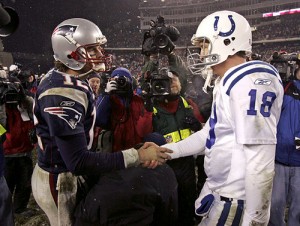
Just imagine a scenario where the Patriots and Colts play one weekend for the AFC Championship and one team plays on the Colts home field for the Super Bowl two weeks later. (Photo sourced from: http://bostonsportsu18.com/?p=7545)
With the Matt Ryan era of Atlanta Falcons football, there’s no doubt that the “Dirty Birds” will want to upset the divisional rival Saints and keep them from “hosting” Super Bowl XLVII at the Superdome. The Tampa Bay Buccaneers and Carolina Panthers could even be doing their part to work as spoilers depending on their franchise fortunes in the next few seasons.
The perfect storm—in more ways than one—awaits at the end of the 2013-14 season, however. Not only will Super Bowl XLVIII potentially be a cold-weather championship game in New Jersey, but rivals of both the New York Jets and New York Giants will be trying all season and through the playoffs to prevent the G-Men and J-E-T-S from having not only a home game, but a New York showdown. The NFL should already be salivating at the thought of both the AFC East and NFC East rivals of the Jets and Giants doing everything they can to keep those teams out of the Super Bowl.
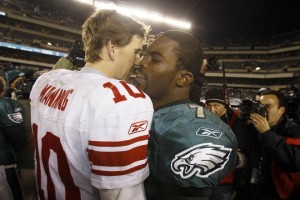
Two guys that Jerry Jones does NOT want to see hoisting the Lombardi Trophy at the 50-yard line at Cowboys Stadium this year. (AP Photo by Matt Slocum)
For many years, the NFL has managed to avoid the potential competition issue of a team playing in a Super Bowl hosted at their home stadium. There is nothing in the selection or qualification process that says a host city must be a “neutral” site; only that the stadium hosting the game should be the home of a current team. Given the league’s cavalier willingness to potentially stage Super Bowl XLVIII in a New Jersey blizzard, it is hard to believe that—for better or for worse—any changes will be undertaken if/when a team finally earns the distinction of having true home field advantage in the championship game.
Here’s my take on this: as long as tickets are made equally available to fans of both teams competing for the Lombardi Trophy, the idea of a “hosting” Super Bowl team doesn’t sound too distasteful. Geographic location of the host city in the past—even if not a team’s actual stadium—has surely led to situations where one team’s fan had easier access to getting themselves to the game, resulting in a slight advantage for one team over the other. Part of this has to do with the franchises themselves and how well their fans travel; neither Pittsburgh nor Arizona were very close to Tampa, Florida when the Steelers and Cardinals played in Super Bowl XLIII, but the stadium filled up nonetheless and each team was well-represented.
The other issue to consider, however, will be whether or not a competitive advantage shows itself for a team playing the Super Bowl in its home stadium with all of its normal practice facilities. This would seem to be a no-brainer—the hosting team’s players and staff wouldn’t have to worry about traveling or getting used to new surroundings in the weeks leading up to the big game—but until it happens at least once there won’t be sufficient data to understand whether or not any advantage could be judged as “unfair” to the game itself. There’s nothing to say that a home team wouldn’t be placed under further pressure to win as a host team, resulting in stress that could not be overcome and a particularly crushing Super Bowl loss. That said, consecutive wins by a hosting Super Bowl team would likely call for changes from both the fans and the league officials.
All of this considered, NFL fans might get to again see what happens when a rival team stakes their claim in a Super Bowl hosted by their hated counterparts should the Eagles or Giants represent the National Football Conference at “JerryWorld” this February; such a scenario hasn’t really taken place since the Oakland Raiders played in Super Bowl XXXVII, which was hosted by Qualcomm Stadium, home of their AFC West rival Chargers. Any FOX SPORTS executive in their right mind would salivate at the thought of filming Jerry Jones’ reaction to Michael Vick or Eli Manning toasting a championship for their team in the house he built during the national television broadcast.
But that’s just my take; how do you all feel about the potential for a team to play the Super Bowl in their own stadium? Be sure to weigh in through the comments and vote in the polls below!
As soon as Dallas Cowboys owner Jerry Jones built his monument to football in Arlington, Texas, and earned the right to host Super Bowl XLV, his stated goal for “America’s Team” was to make a Super Bowl run and become the first team to hold true “home-field” advantage for the biggest game on the NFL calendar. With the Cowboys coming off a successful season where they won the NFC East division and tallied their first breakthrough playoff victory under head coach Wade Philips, the idea didn’t seem too far-fetched.
Fast-forward to the end of the 2010 NFL season and this year’s Cowboys won’t even finish with a winning record or make the playoffs, let alone compete for the chance to play host to the league’s title game.
However, as we look ahead to the next three Super Bowl venues—the only future venues that have been confirmed at this time—there is a legitimate chance that an NFL team could take the field with the Lombardi Trophy on the line at their stadium.
Before we get to those possibilities, however, let’s consider how close—spoiler: or not very close at all—the NFL has gotten to having a team actually “host” a Super Bowl they played in over the past 20 seasons. Between Super Bowl XXVI at the end of the 1991-92 season and the upcoming Super Bowl XLV to end this season, only three times has a team actually made the playoffs in a year where their home stadium was slated to host the big game. Super Bowl XXIX in 1995 was held at Joe Robbie Stadium; the Dolphins ended up the AFC #3 seed but lost in the Divisional Round of the playoffs. The Dolphins had another shot at “hosting” Super bowl XXXIII in 1999 when the game was held at the re-named Pro Player Stadium; as the AFC #4 seed, they again lost in the Divisional Round. The most recent opportunity a team made the playoffs when their stadium was hosting the championship was for Super Bowl XXXV in 2001 when the Tampa Bay Buccaneers were the NFC #5 seed; they lost in the Wild Card Round and did not get to play for at Raymond James Stadium with the title on the line.
Twenty years of opportunities for our sample purposes, and three teams made the playoffs; good for a paltry 15% chance. And none of the potential “host” teams even made their Conference Championship game; perhaps the NFL media should start talking up the “Super Bowl Host Curse” instead of focusing on ideas like the “Super Bowl Hangover” or “Madden Curse” to explain teams that don’t meet expectations.
Part of the issue, however, has been that the NFL’s focus on hosting the Super Bowl in warm weather stadiums has set up a situation where teams that do not place at the top of the league end up having their home field used for the showcase game.
Consider some of the venues that have been used in the past twenty years: the Georgia Dome (Super Bowls XXVIII and XXXIV) before the Falcons got Michael Vick or Matt Ryan; the Louisiana Superdome (Super Bowls XXXI and XXXVI) before the “Aints” returned to being Saints; the Rose Bowl (Super Bowl XXVII) which technically had no NFL team; Qualcomm Stadium (Super Bowls XXXII and XXXVII) before the Chargers became relevant; and even a three-year stretch of Reliant Stadium, ALLTEL Stadium, and Ford Field from Super Bowl XXXVIII through XL, homes of the Texans, Jaguars, and Lions respectively. That series of games saw the Super Bowl hosted for three consecutive years in the stadiums of teams that have never made it to the Super Bowl as a participant.
But—as evidenced by the selection of New Meadowlands Stadium in New Jersey for Super Bowl XLVIII in February of 2014—we are entering a brave new world of Super Bowl hosts. Sure, the Louisiana Superdome gets yet another game in 2013, but the Saints are not the embarrassment that they once were. And once Super Bowl XLV is over—and a new collective bargaining agreement is reached—we’ll be looking ahead to Super Bowl XLVI at Lucas Oil Stadium, home of the Indianapolis Colts. Barring any major injuries to key parts of the Colts, Saints, Jets and Giants rosters, the NFL is looking at three years in a row where there are improved chances that a team might end up truly “hosting” a Super Bowl.
It’s not just about good teams getting the right to host the Super Bowl and wanting to make it a memorable event for their fans, however; when you have the Super Bowl at the stadiums of teams who are among the upper echelon of the league, you also start dealing with teams that have significant and meaningful rivalries.
Consider this: the Indianapolis Colts, one of the top teams in the NFL for the past decade, will certainly be considered a solid bet for making a run at Super Bowl XLVI. Consider this as well: the New England Patriots—who have been a yearly out of division rival to the Colts—would probably love nothing more than to upstage Indianapolis and represent the American Football Conference at the end of next season. And given the quality of each team, neither team would be a stretch to represent their conference in the Super Bowl. The stakes of a Super Bowl appearance—already the highest honor a team can achieve aside from raising the trophy—would be even higher.
With the Matt Ryan era of Atlanta Falcons football, there’s no doubt that the “Dirty Birds” will want to upset the divisional rival Saints and keep them from “hosting” Super Bowl XLVII at the Superdome. The Tampa Bay Buccaneers and Carolina Panthers could even be doing their part to work as spoilers depending on their franchise fortunes in the next few seasons.
The perfect storm—in more ways than one—awaits at the end of the 2013-14 season, however. Not only will Super Bowl XLVIII potentially be a cold-weather championship game in New Jersey, but rivals of both the New York Jets and New York Giants will be trying all season and through the playoffs to prevent the G-Men and J-E-T-S from having not only a home game, but a New York showdown. The NFL should already be salivating at the thought of both the AFC East and NFC East rivals of the Jets and Giants doing everything they can to keep those teams out of the Super Bowl.
For many years, the NFL has managed to avoid the potential competition issue of a team playing in a Super Bowl hosted at their home stadium. There is nothing in the selection or qualification process that says a host city must be a “neutral” site; only that the stadium hosting the game should be the home of a current team. Given the league’s cavalier willingness to potentially stage Super Bowl XLVIII in a New Jersey blizzard, it is hard to believe that—for better or for worse—any changes will be undertaken if/when a team finally earns the distinction of having true home field advantage in the championship game.
Here’s my take on this: as long as tickets are made equally available to fans of both teams competing for the Lombardi Trophy, the idea of a “hosting” Super Bowl team doesn’t sound too distasteful. Geographic location of the host city in the past—even if not a team’s actual stadium—has surely led to situations where one team’s fan had easier access to getting themselves to the game, resulting in a slight advantage for one team over the other. Part of this has to do with the franchises themselves and how well their fans travel; neither Pittsburgh nor Arizona were very close to Tampa, Florida when the Steelers and Cardinals played in Super Bowl XLIII, but the stadium filled up nonetheless and each team was well-represented.
The other issue to consider, however, will be whether or not a competitive advantage shows itself for a team playing the Super Bowl in its home stadium with all of its normal practice facilities. This would seem to be a no-brainer—the hosting team’s players and staff wouldn’t have to worry about traveling or getting used to new surroundings in the weeks leading up to the big game—but until it happens at least once there won’t be sufficient data to understand whether or not any advantage could be judged as “unfair” to the game itself. There’s nothing to say that a home team wouldn’t be placed under further pressure to win as a host team, resulting in stress that could not be overcome and a particularly crushing Super Bowl loss. That said, consecutive wins by a hosting Super Bowl team would likely call for changes from both the fans and the league officials.
All of this considered, NFL fans might get to again see what happens when a rival team stakes their claim in a Super Bowl hosted by their hated counterparts should the Eagles or Giants represent the National Footba
As soon as Dallas Cowboys owner Jerry Jones built his monument to football in Arlington, Texas, and earned the right to host Super Bowl XLV, his stated goal for “America’s Team” was to make a Super Bowl run and become the first team to hold true “home-field” advantage for the biggest game on the NFL calendar. With the Cowboys coming off a successful season where they won the NFC East division and tallied their first breakthrough playoff victory under head coach Wade Philips, the idea didn’t seem too far-fetched.
Fast-forward to the end of the 2010 NFL season and this year’s Cowboys won’t even finish with a winning record or make the playoffs, let alone compete for the chance to play host to the league’s title game.
However, as we look ahead to the next three Super Bowl venues—the only future venues that have been confirmed at this time—there is a legitimate chance that an NFL team could take the field with the Lombardi Trophy on the line at their stadium.
Before we get to those possibilities, however, let’s consider how close—spoiler: or not very close at all—the NFL has gotten to having a team actually “host” a Super Bowl they played in over the past 20 seasons. Between Super Bowl XXVI at the end of the 1991-92 season and the upcoming Super Bowl XLV to end this season, only three times has a team actually made the playoffs in a year where their home stadium was slated to host the big game. Super Bowl XXIX in 1995 was held at Joe Robbie Stadium; the Dolphins ended up the AFC #3 seed but lost in the Divisional Round of the playoffs. The Dolphins had another shot at “hosting” Super bowl XXXIII in 1999 when the game was held at the re-named Pro Player Stadium; as the AFC #4 seed, they again lost in the Divisional Round. The most recent opportunity a team made the playoffs when their stadium was hosting the championship was for Super Bowl XXXV in 2001 when the Tampa Bay Buccaneers were the NFC #5 seed; they lost in the Wild Card Round and did not get to play for at Raymond James Stadium with the title on the line.
Twenty years of opportunities for our sample purposes, and three teams made the playoffs; good for a paltry 15% chance. And none of the potential “host” teams even made their Conference Championship game; perhaps the NFL media should start talking up the “Super Bowl Host Curse” instead of focusing on ideas like the “Super Bowl Hangover” or “Madden Curse” to explain teams that don’t meet expectations.
Part of the issue, however, has been that the NFL’s focus on hosting the Super Bowl in warm weather stadiums has set up a situation where teams that do not place at the top of the league end up having their home field used for the showcase game.
Consider some of the venues that have been used in the past twenty years: the Georgia Dome (Super Bowls XXVIII and XXXIV) before the Falcons got Michael Vick or Matt Ryan; the Louisiana Superdome (Super Bowls XXXI and XXXVI) before the “Aints” returned to being Saints; the Rose Bowl (Super Bowl XXVII) which technically had no NFL team; Qualcomm Stadium (Super Bowls XXXII and XXXVII) before the Chargers became relevant; and even a three-year stretch of Reliant Stadium, ALLTEL Stadium, and Ford Field from Super Bowl XXXVIII through XL, homes of the Texans, Jaguars, and Lions respectively. That series of games saw the Super Bowl hosted for three consecutive years in the stadiums of teams that have never made it to the Super Bowl as a participant.
But—as evidenced by the selection of New Meadowlands Stadium in New Jersey for Super Bowl XLVIII in February of 2014—we are entering a brave new world of Super Bowl hosts. Sure, the Louisiana Superdome gets yet another game in 2013, but the Saints are not the embarrassment that they once were. And once Super Bowl XLV is over—and a new collective bargaining agreement is reached—we’ll be looking ahead to Super Bowl XLVI at Lucas Oil Stadium, home of the Indianapolis Colts. Barring any major injuries to key parts of the Colts, Saints, Jets and Giants rosters, the NFL is looking at three years in a row where there are improved chances that a team might end up truly “hosting” a Super Bowl.
It’s not just about good teams getting the right to host the Super Bowl and wanting to make it a memorable event for their fans, however; when you have the Super Bowl at the stadiums of teams who are among the upper echelon of the league, you also start dealing with teams that have significant and meaningful rivalries.
Consider this: the Indianapolis Colts, one of the top teams in the NFL for the past decade, will certainly be considered a solid bet for making a run at Super Bowl XLVI. Consider this as well: the New England Patriots—who have been a yearly out of division rival to the Colts—would probably love nothing more than to upstage Indianapolis and represent the American Football Conference at the end of next season. And given the quality of each team, neither team would be a stretch to represent their conference in the Super Bowl. The stakes of a Super Bowl appearance—already the highest honor a team can achieve aside from raising the trophy—would be even higher.
With the Matt Ryan era of Atlanta Falcons football, there’s no doubt that the “Dirty Birds” will want to upset the divisional rival Saints and keep them from “hosting” Super Bowl XLVII at the Superdome. The Tampa Bay Buccaneers and Carolina Panthers could even be doing their part to work as spoilers depending on their franchise fortunes in the next few seasons.
The perfect storm—in more ways than one—awaits at the end of the 2013-14 season, however. Not only will Super Bowl XLVIII potentially be a cold-weather championship game in New Jersey, but rivals of both the New York Jets and New York Giants will be trying all season and through the playoffs to prevent the G-Men and J-E-T-S from having not only a home game, but a New York showdown. The NFL should already be salivating at the thought of both the AFC East and NFC East rivals of the Jets and Giants doing everything they can to keep those teams out of the Super Bowl.
For many years, the NFL has managed to avoid the potential competition issue of a team playing in a Super Bowl hosted at their home stadium. There is nothing in the selection or qualification process that says a host city must be a “neutral” site; only that the stadium hosting the game should be the home of a current team. Given the league’s cavalier willingness to potentially stage Super Bowl XLVIII in a New Jersey blizzard, it is hard to believe that—for better or for worse—any changes will be undertaken if/when a team finally earns the distinction of having true home field advantage in the championship game.
Here’s my take on this: as long as tickets are made equally available to fans of both teams competing for the Lombardi Trophy, the idea of a “hosting” Super Bowl team doesn’t sound too distasteful. Geographic location of the host city in the past—even if not a team’s actual stadium—has surely led to situations where one team’s fan had easier access to getting themselves to the game, resulting in a slight advantage for one team over the other. Part of this has to do with the franchises themselves and how well their fans travel; neither Pittsburgh nor Arizona were very close to Tampa, Florida when the Steelers and Cardinals played in Super Bowl XLIII, but the stadium filled up nonetheless and each team was well-represented.
The other issue to consider, however, will be whether or not a competitive advantage shows itself for a team playing the Super Bowl in its home stadium with all of its normal practice facilities. This would seem to be a no-brainer—the hosting team’s players and staff wouldn’t have to worry about traveling or getting used to new surroundings in the weeks leading up to the big game—but until it happens at least once there won’t be sufficient data to understand whether or not any advantage could be judged as “unfair” to the game itself. There’s nothing to say that a home team wouldn’t be placed under further pressure to win as a host team, resulting in stress that could not be overcome and a particularly crushing Super Bowl loss. That said, consecutive wins by a hosting Super Bowl team would likely call for changes from both the fans and the league officials.
All of this considered, NFL fans might get to again see what happens when a rival team stakes their claim in a Super Bowl hosted by their hated counterparts should the Eagles or Giants represent the National Football Conference at “JerryWorld” this February; such a scenario hasn’t really taken place since the Oakland Raiders played in Super Bowl XXXVII, which was hosted by Qualcomm Stadium, home of their AFC West rival Chargers. Any FOX SPORTS executive in their right mind would salivate at the thought of filming Jerry Jones’ reaction to Michael Vick or Eli Manning toasting a championship for their team in the house he built during the national television broadcast.
But that’s just my take; how do you all feel about the potential for a team to play the Super Bowl in their own stadium? Be sure to weigh in through the comments and vote in the polls below!
ll Conference at “JerryWorld” this February; such a scenario hasn’t really taken place since the Oakland Raiders played in Super Bowl XXXVII, which was hosted by Qualcomm Stadium, home of their AFC West rival Chargers. Any FOX SPORTS executive in their right mind would salivate at the thought of filming Jerry Jones’ reaction to Michael Vick or Eli Manning toasting a championship for their team in the house he built during the national television broadcast.
But that’s just my take; how do you all feel about the potential for a team to play the Super Bowl in their own stadium? Be sure to weigh in through the comments and vote in the polls below!
